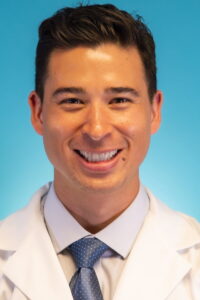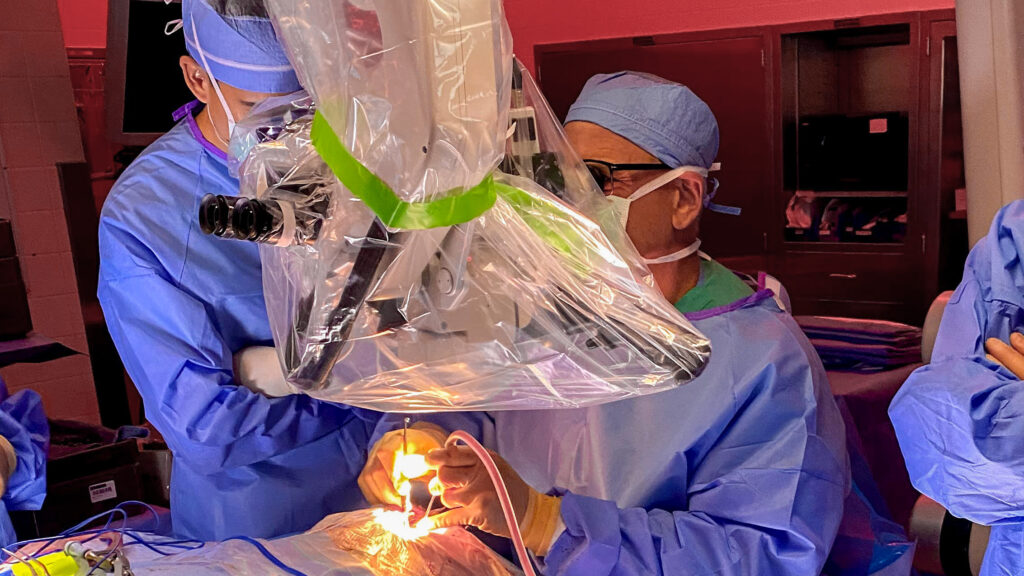
Neurotology Fellow Matthew Shew, MD, was recently named one of four recipients of the Dean’s Scholars Award from the School of Medicine at Washington University in St. Louis. Dr. Shew’s research efforts are focused on optimizing the benefits of cochlear implants by using artificial intelligence (AI) and machine learning.
The Dean’s Scholars program supports outstanding individuals committed to a career as a physician-scientist. Applicants are evaluated based on their evidence of commitment to research, the quality of their research proposal, the strength of their mentorship team and training environment, and the impact that support from the Dean’s Scholars program would have on their career.
Shew will join the otolaryngology faculty at Washington University in July when his neurotology fellowship ends. To fulfill requirements of the award, he will devote 50% of his effort to his research program which is focused on optimizing the benefits of cochlear implants.
“We know that adult patients do well with cochlear implants as a whole, however, we continue to see a wide variety of outcomes,” said Dr. Shew. “We have difficulty predicting the degree of benefit patients will achieve as measured by speech recognition scores.”
Dr. Shew’s proposal will specifically evaluate how AI and machine learning can be used to help predict cochlear implant performance. He will compare current standard statistical models to AI/machine learning approaches. The study will consider clinical variables alone, and clinical variables in combination with electrocochleography (EcochG), an electrical signal of cochlear activity measured during implantation of the electrode.

“Some of our preliminary work has shown EcochG may improve our ability to predict cochlear implant performance because it provides an objective measure of sensory and neuronal cochlear health at the time of implantation,” he said.
The Dean’s Scholars Award is offered through Washington University School of Medicine’s Division of Physician-Scientists, established to promote the development of physician-scientists by providing strong institutional support for their training and recruitment.
Physician-scientists are crucial to developing new therapeutics and approaches to diagnosing and treating disease. But their numbers are declining, with only 1.5% of U.S. physicians today conducting research.
Dr. Shew is honored to have his proposal selected from such a strong pool of candidates.
“The program will provide a fantastic steppingstone as I begin my academic career here at Washington University,” he said. “I couldn’t be more excited to join such a wonderful and accomplished group of faculty members.”
The Dean’s Scholars program is a mentored research award, meaning awardees must identify a mentorship committee of scientific or technical experts to provide guidance.
“One of the best pieces of advice ever given to me is, surround yourself with people that are smarter than you,” said Shew.
His mentors include Lindberg Professor and Department of Otolaryngology Chair, Craig Buchman, MD, and AI/machine learning expert Andrew Michelson, MD, assistant professor of medicine in the Division of Pulmonology and Critical Care. Other members of the team include Amanda Ortmann, PhD, Jay Piccirillo, MD, and Douglas Fitzpatrick, PhD, at the University of North Carolina.
“We are incredibly excited to have recruited Dr. Shew to our Department,” said Dr. Buchman. “He is an outstanding young neurotologist and surgeon and has accomplished a great deal as a scientist in a very short time. His selection as a Dean’s Scholar is a wonderful affirmation of his academic potential and the importance of his project for the hearing-impaired community.”
